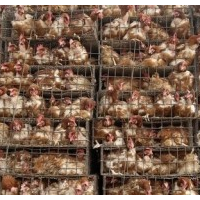California Can Ban Eggs from States that Keep Chickens too Cooped Up

Six egg-producing states lost a federal court fight to block California laws that will require them to nearly double the amount of battery cage space they give to individual chickens or be locked out of the state’s market. The required space is enough for a chicken to turn around, stretch a limb and lay down.
U.S. District Judge Kimberly Mueller, in Sacramento, dismissed the case after ruling that the attorneys general for the states—Missouri, Nebraska, Oklahoma, Alabama, Kentucky and Iowa—had no standing because they represented the interests of egg farmers, rather than the people of the states.
Mueller conceded that some of the producers could take a financial hit, but consumers in general might actually see a decrease in their prices.
California voters approved roomier farm-animal accommodations in-state (Proposition 2) in 2008, which Assembly Bill 1437 extended to other states in 2010. Rep. Steve King (R-Iowa) led an unsuccessful charge in Washington to preempt the law by amending the ginormous farm bill, but failed.
Shortly after President Obama signed the legislation in February, the states filed their lawsuit. They claimed the California law violated the interstate commerce clause of the U.S. Constitution.
California, as the nation’s largest agricultural producer, has a lot of marketplace contact with other states. California consumes 9 billion eggs a year. The nation’s biggest egg producer, Iowa, fills around 30% of the need. Missouri is second, gobbling up 6% of the market or 540 million eggs. California produces 56% of its own eggs.
Dermot Hayes, an agriculture economist at Iowa State University, told the Des Moines Register, this court decision could mean war. “This opens the doors for states to put barriers against other states,” he warned. All traded products were vulnerable, not just agricultural products. The Register said Hayes and Iowa Secretary of Agriculture Bill Northey agreed that Winnebago RVs or Deere tractors might be the next thing to be banned if California finds itself unhappy with Iowa wages.
The heart of Hayes’ argument is that proponents of the California laws are being deceptive. “You can always say those barriers are driven by environmental or social restrictions. But in reality you just want to protect your own producers.”
The reason you can “always say” those things is because humans do terrible things to farm animals. The justification may be a cheaper, more plentiful product, but that doesn’t obviate the cruelty of the conditions, not to mention the often unhealthy product of that compressed process. There are environmental, health and social considerations.
Hens are squashed into an area around 70 square inches, far less than the size of a sheet of paper. Bruce Friedrich, Farm Sanctuary director of Advocacy and Policy, described it thusly:
“Imagine spending your entire life in a wire cage the size of your bathtub with four other people. You wouldn't be able to move, so your muscles and bones would deteriorate. Your feet would become lacerated. You would go insane. That's precisely what happens to laying hens.”
The Pew Commission on Industrial Farm Animal Production singled out chicken battery cages and pig gestation crates as “the most intensive and inhumane production practices” among a range of practices that should be banned. The European Union has banned battery cages.
The California law takes effect in January.
–Ken Broder
To Learn More:
Judge Tosses Suit by 6 States over California Law on Eggs (by Bob Egelko, San Francisco Chronicle)
California Egg Law May Lead to Ag War between States (by Matthew Patane and Donnelle Elle, Des Moines Register)
Judge Tosses Lawsuit Challenging California Egg Law (by Jim Miller, Sacramento Bee)
States Fight California's Chicken Cage Law, but It's Really about Bacon (by Frank Morris, NPR)
Congress Wouldn’t Gut California Chicken Cage Laws, so Missouri Sues to Do It (by Ken Broder, AllGov California)
- Top Stories
- Controversies
- Where is the Money Going?
- California and the Nation
- Appointments and Resignations
- Unusual News
- Latest News
- California Forbids U.S. Immigration Agents from Pretending to be Police
- California Lawmakers Urged to Strip “Self-Dealing” Tax Board of Its Duties
- Big Oil’s Grip on California
- Santa Cruz Police See Homeland Security Betrayal in Use of Gang Roundup as Cover for Immigration Raid
- Oil Companies Face Deadline to Stop Polluting California Groundwater





